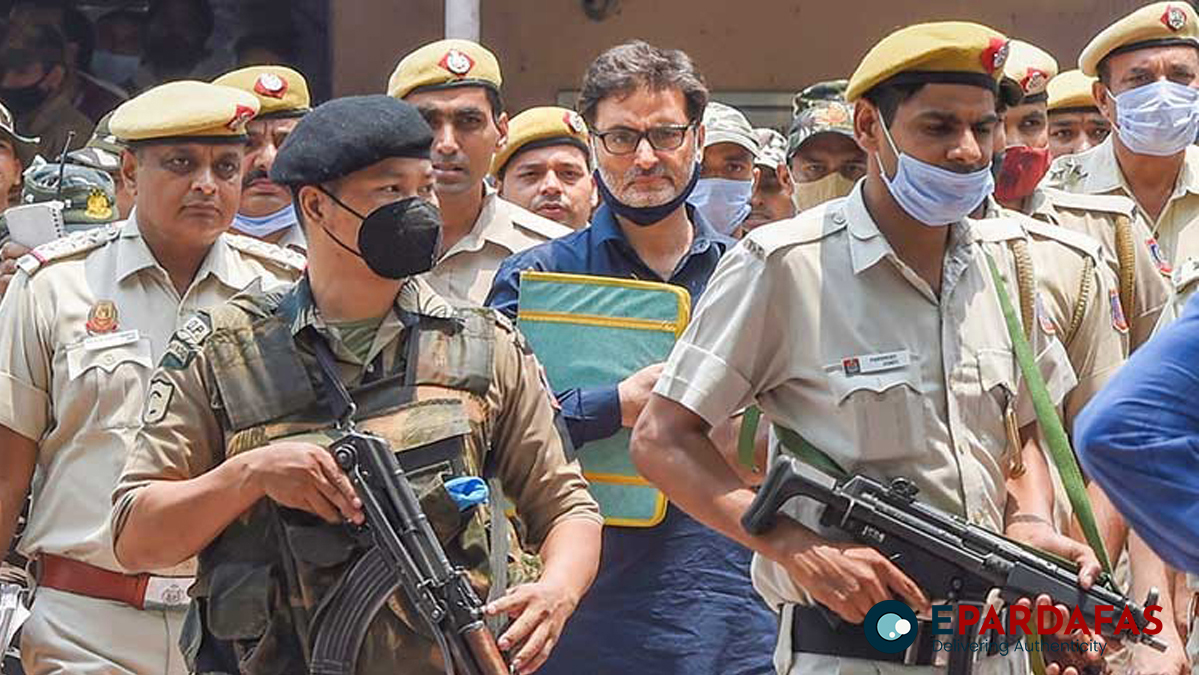
Supreme Court Considers Makeshift Courtroom in Jail for Yasin Malik’s Trial Amid Security Concerns

In a significant development concerning terror convict Yasin Malik, the Supreme Court on Thursday suggested that a makeshift courtroom could be set up in Tihar jail to facilitate his cross-examination in two high-profile terror cases. The remarks came during the hearing of a Central Bureau of Investigation (CBI) plea challenging a Jammu court’s order mandating Malik’s physical presence for trial.
Malik, the leader of the banned Jammu and Kashmir Liberation Front (JKLF), is implicated in the 1989 kidnapping of Rubaiya Sayeed, daughter of former Jammu and Kashmir Chief Minister Mufti Mohammad Sayeed, and the 1990 killing of four Indian Air Force personnel.
Security vs. Fair Trial: Supreme Court’s Observations
The apex court bench, comprising Justices Abhay S. Oka and Augustine George Masih, emphasized the importance of a fair trial while addressing the logistical and security concerns cited by the CBI. The bench remarked, “In our country, even Ajmal Kasab [the lone captured terrorist from the 26/11 Mumbai attacks] was given a fair trial. A courtroom can be set up in jail for this purpose.”
The court also directed the authorities to provide details on the number of witnesses in the case, highlighting that their safety would also need to be ensured.
Solicitor General Tushar Mehta, representing the CBI, argued against Malik’s physical transfer to Jammu, citing potential risks. Mehta suggested that the trial could be shifted to Delhi if Malik insisted on a personal appearance.
Jammu Court’s Mandate and Its Implications
The Jammu Special Court had earlier ordered Malik’s physical presence for cross-examination, a move the central agency is resisting. Malik, currently lodged in Tihar prison, has remained adamant about his personal appearance in court, a stance that complicates the security dynamics of the trial.
The Supreme Court’s intervention highlights the delicate balance between ensuring justice and addressing national security concerns.
Parallels with Ajmal Kasab’s Trial
The court’s reference to Ajmal Kasab underscores India’s commitment to upholding the principles of justice, even in cases involving heinous acts of terror. Kasab, the sole surviving gunman from the 2008 Mumbai terror attacks, was tried in a high-security environment in Mumbai, ensuring transparency and due process despite the magnitude of his crimes.
Kasab’s trial remains a testament to the judiciary’s resolve to uphold the rule of law, even as the nation grapples with the scars of terrorism. His eventual execution in 2012 was carried out following a comprehensive legal process, setting a precedent for handling terror cases.
Terrorism and State-Enabled Proxy Wars
The two cases involving Malik are not only about individual acts of terror but also reflect the broader context of state-sponsored terrorism that has plagued South Asia. Malik, a controversial figure in Jammu and Kashmir’s separatist movement, has long been accused of playing a central role in militancy, with links to cross-border support networks.
India’s experiences with terrorism, from the 1989 Rubaiya Sayeed kidnapping to the 2008 Mumbai attacks, have consistently pointed to the role of Pakistan-based entities like Lashkar-e-Taiba (LeT) and their enablers within the Pakistani establishment.
Mumbai Attacks: A Grim Reminder
As the nation approaches the 16th anniversary of the 26/11 Mumbai attacks, the parallels between Malik’s case and the broader challenge of counterterrorism are striking. The Mumbai attacks, which claimed 165 lives, exposed the vulnerabilities of urban centers to state-enabled terrorism.
The role of Pakistan’s Inter-Services Intelligence (ISI) in supporting LeT operatives, as confirmed by testimonies and intercepted communications, has underscored the need for accountability. The trial of Ajmal Kasab and the investigations into the Mumbai attacks highlighted the meticulous planning behind such operations, which were designed to destabilize and provoke.
The Way Forward: Ensuring Justice and Security
The Supreme Court’s consideration of a makeshift courtroom in Tihar jail for Malik reflects the judiciary’s commitment to balancing justice with security. It also signals the seriousness with which India addresses cases of terrorism, ensuring transparency while safeguarding national interests.
As the global community continues to grapple with the challenges of terrorism, cases like Malik’s underscore the importance of unified action against both non-state actors and their state sponsors. The judiciary’s proactive approach in such cases serves as a reminder that justice must prevail, even in the face of formidable obstacles.
Malik’s trial, much like the 26/11 proceedings, is a test of India’s resolve to uphold the rule of law and combat terrorism in all its forms. The outcomes will not only shape the narrative around justice for victims but also reinforce India’s position as a nation committed to the principles of democracy and accountability.












Comments